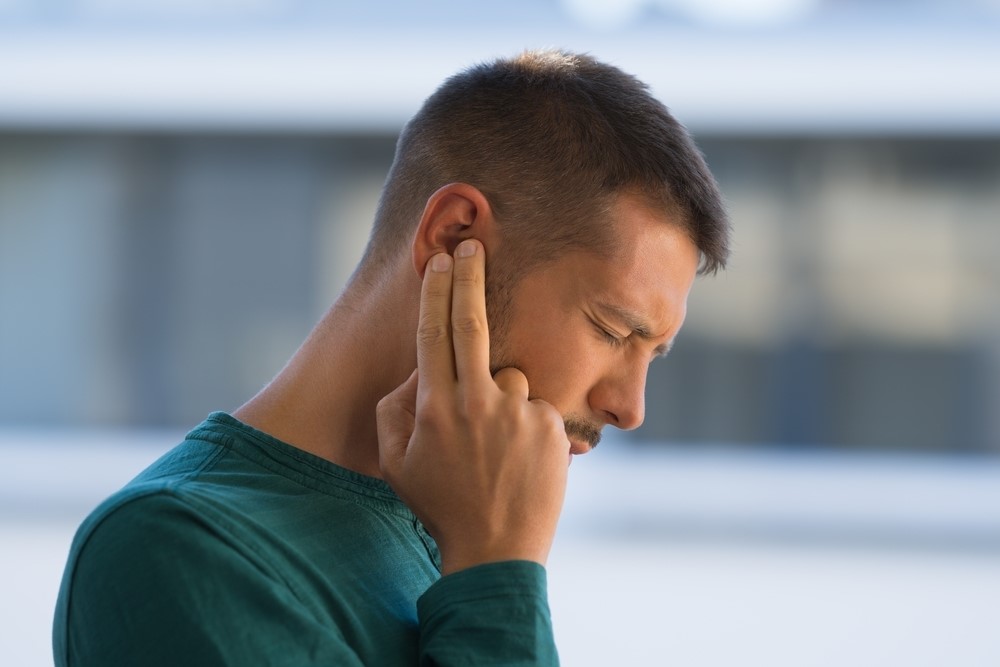Are you experiencing a ringing in your ear due to earwax buildup? Can earwax be the cause? Yes – earwax buildup can cause Tinnitus. It’s common for earwax to trigger tinnitus by blocking the ear canal. In this article, we review the causes of earwax buildup as well as how earwax can cause tinnitus in more detail.
Earwax is a natural secretion found in the ear with an important function. Earwax, also known as cerumen, keeps the ear canal lubricated — protecting the inner ear from dirt and bacteria. In turn, this helps prevent ear infections.
Request a hearing test appointment today
Sometimes, too much earwax can build up in the ear. There are a several reasons why this might occur:
- Your ear canals are unusually narrow or damaged.
- You have a lot of hair growing in your ear canals (that traps too much earwax).
- You have a skin condition that affects your scalp or the skin around your ear.
- You have an ear infection (like Otitis Externa, “swimmers ear”) which causes your ear canal to become inflamed.
- Dry ears — particularly a problem in older people.
Excess earwax buildup causes discomfort, hearing loss and a ringing sensation in the ears. This ringing sensation is a symptom of a condition known as tinnitus. It’s not an external sound so other people can’t hear it. Tinnitus is not a rare condition, and it affects around 15-20% of people (It’s particularly common in older adults.)
How does Earwax cause Tinnitus?
There are multiple reasons why ear wax can cause tinnitus, but what this really boils down to is the nerves in your canal which is the cause of tinnitus.
One of the most important things you need to know about tinnitus is that it’s not a disease. Tinnitus is a symptom indicating there’s a problem with your auditory system. This includes the auditory nerve that connects the inner ear to the brain and the parts of the brain that process sound, such as the auditory cortex.
When ear wax accumulates and becomes impacted, the resulting pressure in your ear canal can stimulate your nerves.
Consequently, your brain might interpret this nerve activity as an indication that a sound is present. The brain may try to compensate by generating internal sounds that aren’t really present!
We typically see ear wax-related tinnitus as a result of:
- A Blockage or Impaction: A common reason for tinnitus related to earwax is the blockage of the ear canal. When earwax accumulates and hardens, it can obstruct the canal, leading to a sensation of ear fullness, hearing loss, and sometimes tinnitus. The blockage can interfere with the normal vibration of the eardrum and auditory ossicles, or bones in the middle ear, which can lead to tinnitus.
- Infection: Earwax buildup can also lead to ear infections by trapping bacteria and fungi in the ear canal. These infections can cause inflammation and fluid buildup in the middle ear, affecting hearing and potentially causing tinnitus.
- Pressure Changes: Accumulated earwax can press against the eardrum, affecting its ability to vibrate properly. This pressure change can disturb the normal hearing process and lead to tinnitus symptoms.
So will tinnitus go away if I remove the ear wax?
Technically, yes, ear wax removal can help tinnitus. If the earwax is the main cause of tinnitus, the symptoms of tinnitus should reside after the earwax is removed – but the tinnitus may be indicative of a wider problem.
What do our experts say?

Remember that although tinnitus is commonly caused by excess earwax buildup, it can also be the result of certain health conditions, like:
- Infections of the ear and sinus
- Hearing loss induced by loud noises
- Heart or blood vessel diseases
- Ménière’s disease
- Brain tumours
- Thyroid problems
- Hormonal changes in women
- A side effect from some medications.
Often, tinnitus is one of the early signs of hearing loss. Those who work in noisy environments, such as construction workers or musicians, can develop tinnitus over time. This is due to an ongoing exposure of noise damaging the sensory hair cells in the inner ear, which transmits sound waves to the brain. Tinnitus is one of the most common conditions among servicemen and women returning from war in Afghanistan and Iraq.
Despite the many potential causes of tinnitus, some people develop the condition for no obvious reason. When the sound is loud and persistent, it can cause fatigue, depression and anxiety. Identifying tinnitus early on can minimise the risk of developing a more serious health condition. It’s important to rule out ear wax buildup as the cause of tinnitus as if this is the sole cause, it can be resolved quickly and efficiently.
How long will tinnitus last after ear wax removal?
The duration of tinnitus after earwax removal very much depends from person to person, depending on the underlying cause of your tinnitus and just how much build up you had.
For some individuals, tinnitus may diminish or resolve completely shortly after the earwax is removed. This could happen within hours to a few days as the ear canal clears and normal hearing returns.
However, if the tinnitus was not solely due to earwax buildup (see above), or if the auditory system has been affected in other ways (for example, by prolonged exposure to loud noises or age-related hearing loss), the tinnitus may persist even after the earwax has been removed. In these cases, the tinnitus might last longer and require additional treatments. If this occurs, get in contact with us and book an appointment.
How do I know if I have ear wax causing tinnitus?
If your tinnitus developed at the same time as other symptoms indicative of earwax building it’s most likely that the earwax is the cause of your tinnitus. But remember, it’s always best to seek advice from a qualified audiologist to see if it is ear wax buildup that is causing your tinnitus.
So should I try to clean the wax out myself?
When there’s too much earwax in your ears, you might have attempted to clean them with a cotton bud or other object. This is dangerous, risking perforation of the eardrum and increasing the likelihood of infection. Inserting objects into your ear can push the earwax further into your ear canal, causing impacted wax. The pressure from this impacted wax stimulates nerve cells in the inner ear and the brain mistakenly reads these signals as noise.
Next time you’re reaching for the cotton buds, think again. If you’re looking to clean your ears, read our guide on cleaning your ears without using cotton buds.
What clinical methods are used to remove ear wax build up to relieve Tinnitus?
Instead of attempting to remove the wax yourself, there are clinical methods for removing earwax buildup. Typically, the methods used to relieve tinnitus are focused on safely and effectively clearing the ear canal without damaging the ear.
Here are the most commonly used methods:
- Microsuction: This method involves using a microscope to view the ear canal and a small suction device to gently remove the earwax. It’s precise and considered safe, reducing the risk of ear damage. You can read more about what microsuction involves here.
- Ear Irrigation or syringing: Ear irrigation, also commonly known as ear syringing, involves using a controlled stream of warm water to flush out the earwax. This method is not advisable due to concerns about potential complications, such as ear infections or eardrum perforation.
- Manual Removal: As a last resort, special instruments like a curette, forceps, or a loop can be used to manually remove earwax (by a professional of course). This method is particularly useful for hard or impacted wax and is often performed under a microscope or with a headlap.
- Ear Drops: While not a direct clinical procedure, we often recommend using olive oil ear drops to soften earwax before attempting other removal methods. In fact, this is the method we initially use if you visit us for ear wax removal in any one of our clinics.
Remember: These methods should only be performed by trained professionals to avoid the risk of injury or further complications.
What Does Tinnitus Feel Like?
Tinnitus is not exclusively a ringing sensation in the ears, although it is most frequently described as this. Tinnitus can manifest in different sounds, such as buzzing, roaring, clicking, hissing or humming. Tinnitus varies in pitch from low roaring sounds to high squeals and can be heard in one or both ears. It isn’t always present either, and in rare cases, like pulsatile tinnitus, the sound is a rhythmic pulsing or whooshing that matches your heartbeat.
Treatment for Tinnitus caused by ear wax removal
The first stage of action is to see an experienced audiologist or doctor to determine the cause of your tinnitus. As we’ve established, tinnitus could result from an underlying health condition or a side effect of some medication. If it is excess earwax buildup causing your tinnitus, there are ear wax removal options out there that are safe and effective.
Microsuction ear wax removal is probably the best option, as it uses gentle suction (like a vacuum) to remove wax from the ear. This method is less messy than irrigation which uses water to flush out earwax. It also minimises the risk of infection, as the microsuction process is done dry with no direct contact with the skin or ear canal.
Related: Syringing vs Microsuction Ear Wax Removal — Which Works Best?
Don’t leave tinnitus untreated. Book an ear wax removal appointment in Kent or London with one of our expert audiologists today and find out how we can help you regain your hearing.








